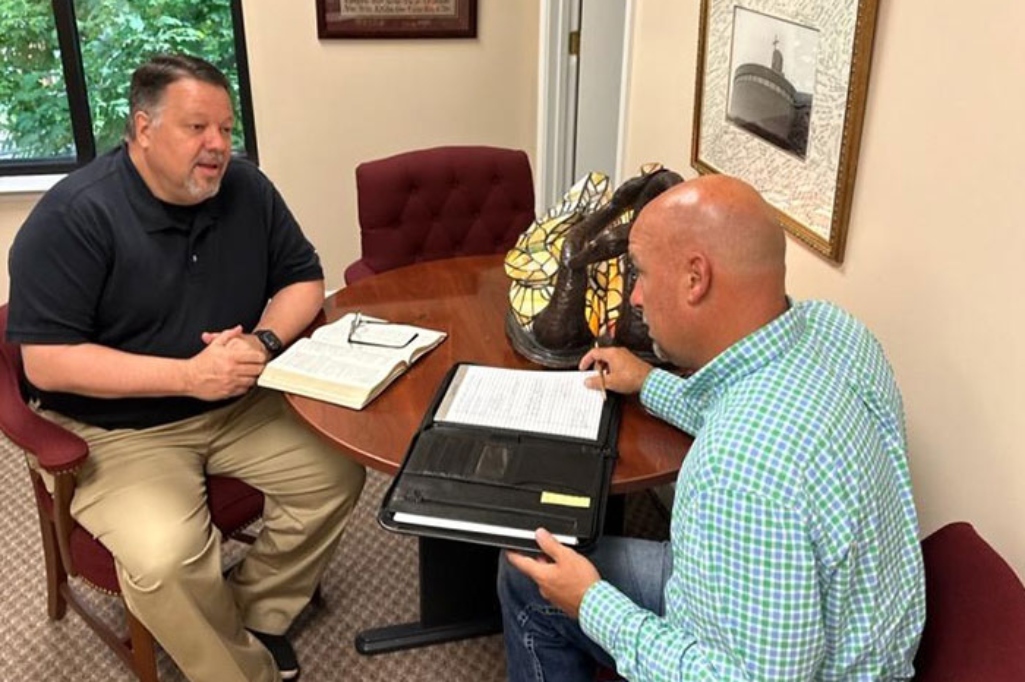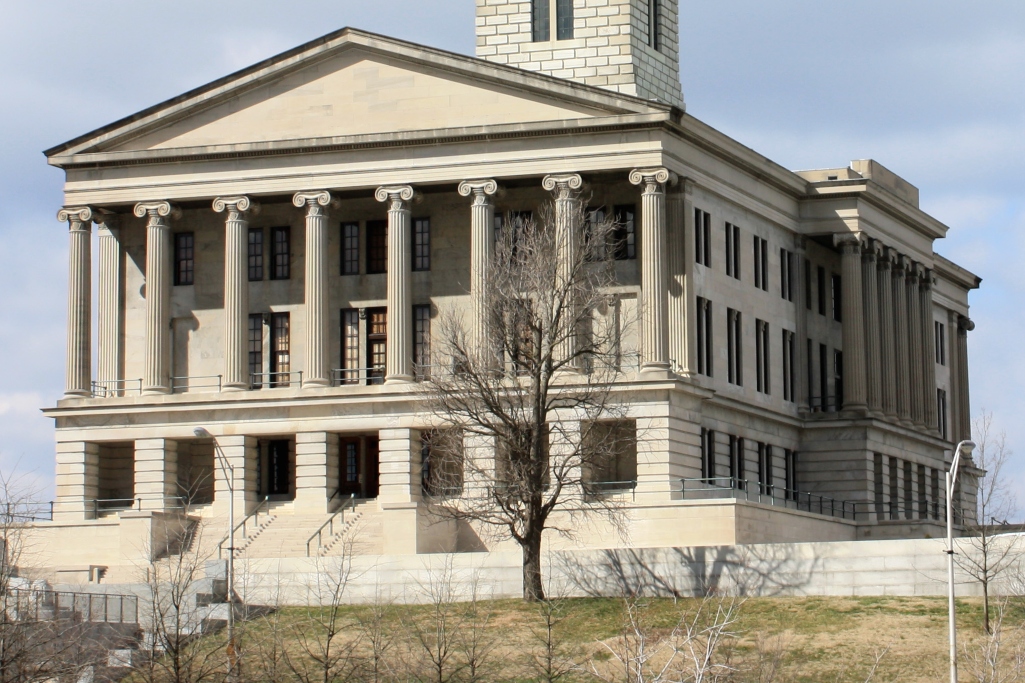
Pastor Steve Freeman's (right) experience being mentored by his former pastor Larry Robertson (left) of Hilldale Baptist showed him the importance of pastors learning on the job before taking their first church.
SPRINGFIELD, Tenn. (BP) — Soon after Steve Freeman accepted his first pastorate more than 20 years ago at Slayden Baptist Church in Cumberland Furnace, Tenn., he realized after a few months that he was in over his head, he recalled.
“They taught me that I didn’t know anything,” Freeman said.
“I realized that even though I was in seminary and pursuing a degree, there’s just some things you are not going to learn in the classroom,” said Freeman, who has served as pastor of Grace Baptist Church in Springfield for the past 17 years.
“There was a lot that I did not know and I had to go figure it out,” he said.
After 18 months at Slayden Baptist, he resigned and returned to his home church (Hilldale Baptist in Clarksville, Tenn.) and began serving as a pastoral intern.
Freeman noted that while his first pastorate didn’t go quite the way he expected, he learned from it and today he has a good relationship with his first congregation. What’s more, the seeds for a residency program that one day would help young pastors (before they took their first church) were planted in his mind.
In 2012 Freeman began working on his doctorate from New Orleans Baptist Theological Seminary (NOBTS). During that process he developed a project on a residency program based in part on what he learned as a pastoral intern when he returned to Hilldale Baptist Church.
The residency program is based on the same principle the medical profession uses to teach men and women how to become doctors.
“Could one imagine a scenario where a surgeon was sent into an operating room to perform surgery with only his academic training without having first worked with a mentor who was an expert in that particular field?” he asked.
“If this kind of experience is important for the care of physical needs, how much more so is it needed for the spiritual needs,” he continued.
The residency program allows a future pastor to get hands-on experience without “messing up three or four churches before you figure out” what it takes to be a pastor, Freeman said.
“Until you walk in as pastor of your first church, you really don’t know that you don’t know anything until you get there and then it is too late.”
The residency program at Grace Baptist
Freeman initiated the Grace for You Ministries Pastoral Residency Program at Grace Baptist more than 10 years ago.
“My heart is to see young pastors receive what I had the opportunity to receive at Hilldale Baptist Church — field experience coupled with my academic experience.”
The program began with pastoral internships, but soon grew into what it is today — a two-year program that allows future pastors to sharpen their leadership skills in the field, Freeman explained.
Grace’s program is only for master of divinity degree graduates from New Orleans Seminary who plan to become pastors, Freeman said. At Grace, a resident joins the staff as associate pastor in residence. It is a paid position, he added.
The resident is in charge of the day-to-day operation of the staff under the close advice of the senior pastor, Freeman said.
The residents basically do what any pastor has to do — prepare a weekly sermon (they preach on Wednesday nights), pastoral care such as hospital visits and funerals, conduct staff meetings, supervise ministerial and support staff and volunteers and more.
“They learn what a church operation looks like outside of Sunday. What’s more, they get the opportunity to do it before they become a pastor,” Freeman said.
Freeman acknowledged that he has been told that he might want to consider “easing” the residents into all those responsibilities. “I remind them that when they are called to their first church, there is no ‘easing’ into it. I want them to experience exactly what they’re going to experience when they walk out of our door into their first pastorate.”
So far, four men have graduated from the program and all did outstanding jobs, Freeman said. Grace Baptist now has its fifth associate pastor in residence. All of the graduates have gone on to other churches, with each of them serving as the senior pastor.
Once the residents leave, Freeman stays in contact with them. While he mentors them, they in turn serve as his mentors as well, he said.
“These guys know our church because they have served here and know our people. Sometimes I lean on these former residents as much as they lean on me when they go to their first church,” he said.
A resident’s perspective
Drake Nosco, who is in his fifth year as pastor of Grace Baptist Church, Nashville, actually spent three years at Grace Baptist in Springfield. He affirmed that his time in Springfield was extremely beneficial. “It was a great opportunity to learn to lead a church while preparing a sermon every week,” he recalled.
He noted that when he graduated from NOBTS he was not ready to be a pastor right out of seminary. He learned of Freeman and his program from one of his mentors at the seminary who then contacted Freeman and recommended Nosco to him.
Nosco said the program at Grace, Springfield, gave him confidence because he knew he had a “safety net” in Freeman just in case problems arose. “He taught and empowered me to lead.”
Nosco also is appreciative of the members of Grace Baptist who accepted him though they knew his position was not permanent. “Brother Steve led the members there to see the importance of such a position. They knew they were helping the kingdom of God because we (the residents) were going out to help churches without pastors. …
“I probably would not be at Grace Baptist today were it not for the residency program.”
A need for more pastors
Freeman knows of a few churches that have a similar program, but he is hopeful other churches will develop residency programs.
He believes that Grace’s program can be adapted to any size church if a pastor has a heart to invest in a mentorship type of relationship and if he desires for the Lord to build a culture in his church of calling people into the ministry.
“I believe there are a lot of God-called men who are sitting (on) the bench because of their first experience as pastor of a church. And, it’s not necessarily the church. Most of the time, it is our inexperience going in. We are not prepared for what we’re walking into.”
There is a shortage of pastors across the Volunteer State. According to Sing Oldham, pastor engagement specialist for the Tennessee Baptist Mission Board, about 350-400 churches do not have a pastor on any given Sunday in Tennessee.
“One of the key findings that emerged from the Acts 2:17 Initiative is the need to develop a ‘ministerial pipeline’ of God-called, thoroughly equipped pastors and other ministry leaders for our network of churches,” Oldham said. “The residency ministry is a way any size church can help fuel this pipeline.”
Referencing this and other residency models across the state, Oldham added, “The residency program provides an immediate impetus to the ministry of the church where the resident serves; but it is also an investment in leaders who will make a difference for generations to come.”
(EDITOR’S NOTE — Lonnie Wilkey is editor of the Baptist and Reflector, news journal of the Tennessee Baptist Convention. This article originally appeared in the Baptist and Reflector.)


